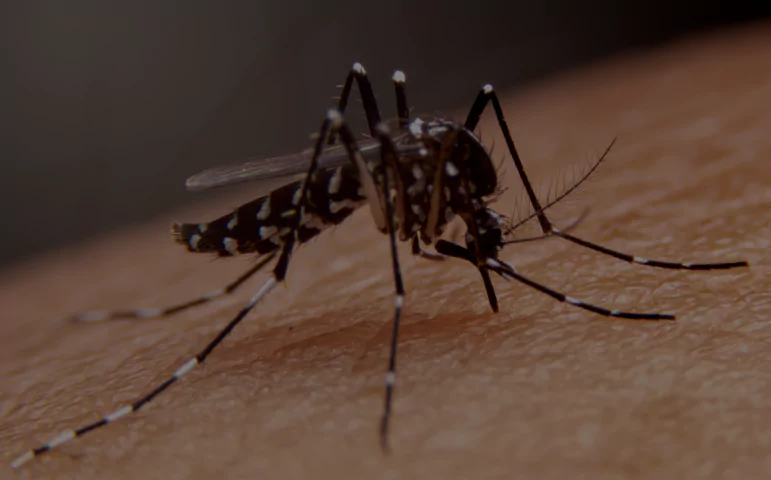
Dengue Fever / Dengue Haemorrhagic Fever occur in post- monsoon period when breeding of mosquitoes is highest due to accumulation of rainwater. It is caused by group B arbovirus (flavivirus). It is caused due to bite of an infected female AEDES AEGYPTI MOSQUITO.
- Mode Of Transmission
- Etiologic Agent
- Clinical Features
- Lab Indication
- Phases
- Febrile Phase
- Critical Phase
- Recovery Phase
- Diagnosis
- Management Of Dengue Fever Is Symptomatic And Supportive
- Management Of Grade I DF / DHF
- Things You Should Know
- Q} Why does Bradycardia occur in dengue?
- Q} In Dengue why does platelet count decrease?
- Q} Why rash occurs in dengue fever?
- Q} Why does mucosal bleeding occur in dengue fever?
Mode Of Transmission
It is transmitted through bite of AEDES AEGYPTI MOSQUITO.
Etiologic Agent
DF/DHF is caused by a group B arbovirus (Flavivirus) and includes serotypes 1, 2, 3 and 4 (Den-1, Den-2, Den-3 and Den-4).
Clinical Features
- FEVER
- GIT {Gastrointestinal tract}: Nausea, Vomiting, Mucosal bleeding, Anorexia
- Abdomen: Pain in the abdomen, mild tenderness, mild liver tenderness
- Skin: Rash, Itching, Acne
- Eye: Pain on eye movement.
- Heart: Bradycardia.
Lab Indication
Dengue Test Positive, Decreased Platelet Count. # Complete blood count # Dengue Profile {if needed ELISA method}
Phases
- Febrile phase
- Critical phase
- Recovery phase
Febrile Phase
- Lasts for 2-7 days
- Complaints in febrile phase :- facial flushing, skin erythema, gen. Bodyache, severe backache, retro-orbital pain, headache, breakbone fever. High fever may cause febrile seizures in children.
- Mild haemorrhagic manifestations like petechial and mucosal membrane, bleeding may be seen.
- Liver is often enlarged and tender
- Earliest laboratory – abnormality is progressive, decrease total WBC count and decrease platelet count which is high probability of dengue, fever (also dengue like fever).
Critical Phase
- Haemocritic levels may occur.
- This phase usually lasts for 24 to 48 hours.
- In this phase, platelet count rapidly decreased .
- Fever usually may be subnormal
- Shock occur when a critical volume of plasma is lost through leakage, it is preceded by warming sign like breathlessness, bradycardia etc.
- Case of dengue with warming sign usually recover with early rehydration.
Recovery Phase
- If patient survives, the 24 hour to 48 hours of critical phase, a gradually reabsorption of extracellular fluid takes place within 40 to 72 hours.
- Bradycardia and ECG changes are common .
- Rashes may be present on palm of the hand and foot .
- WBC count usually start to rise.
The Aedes Aegypti mosquito, or dengue mosquito, is dark coloured and has typical white markings on the legs and lyre like markings on the thorax.
Diagnosis
- Leucopenia
- Thrombocytopenia
- Elevated liver enzymes
- Serum NS1 antigen is highly specific and it is positive
- Patient with severe dengue, chest radiograph (x-ray) to look pleural effusion and ultrasound of abdomen for ascites and gallbladder wall thickening.
Management Of Dengue Fever Is Symptomatic And Supportive
- Bed rest is advisable during acute febrile phase.
- Antipyretics and sponging is essential to keep body temperature above 100*c . Do not prescribe Salicylates (Aspirin) to suspected DF patient. Paracetamol is preferred.
- Analgesic or a mild sedative may be prescribed for severe pain.
- ORS solution is recommended for patients with excessive sweating, nausea, vomiting or diarrhoea to prevent dehydration.
- Patients should be monitored in DHF area until they become afebrile & after platelet & hematocrit determinations are normal. Dengue Haemorrhagic Fever.
Management Of Grade I DF / DHF
- Management during febrile phase is similar to that of DF.
- Patient should be monitored closely. Critical period for monitoring is transition from febrile to afebrile stage, which usually occurs after third day of illness.
- Hematocrit should be determined daily from the third day until the temperature remains normal for one or two days.
- Paracetamol is recommended to keep temperature above 100*c.
- Plenty of fluids like ORS & or fruit juices should be given orally, to the extent patient tolerates.
Things You Should Know
Q} Dengue is viral fever then why do we use antibacterial medicine?
Ans: To avoid SECONDARY infection.
Q} Why does Bradycardia occur in dengue?
Ans: Due to decreased platelet count in plasma, the heart is unable to pump sufficient chronotropic response.
Q} In Dengue why does platelet count decrease?
Ans: Thrombocytopenia in dengue may arise either from decreased production of cells from Bone marrow.
Q} Why rash occurs in dengue fever?
Ans: Reabsorption of extracellular fluid into the blood. Skin tissue is recovering from the wounds that produced a rash and itching.
Q} Why does mucosal bleeding occur in dengue fever?
Ans: Platelets release factors that help maintain the endothelium’s inner lining; thus, platelet count decreases, and coagulopathy occurs.